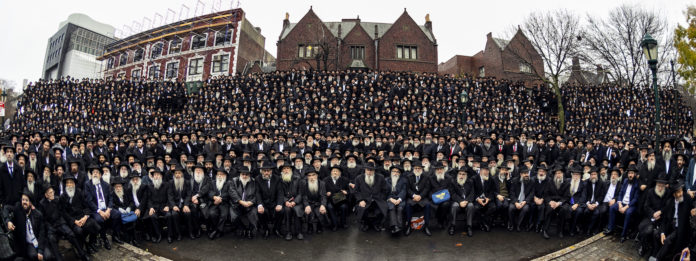
By David Saffer
Thousands of rabbis and community leaders around the world attended the annual International Conference of Chabad-Lubavitch at the New Jersey Convention Center in New York.
The event, which attracted approaching 6,000 delegates from 100 countries, struck a defiant and positive tone as the gathering marked 25 years since the passing of the Rebbe, Rabbi Menachem M. Schneerson.
Coming in the wake of recent anti-Semitic tragedies globally delegates took part in seminars and workshops on combating anti-Semitism, the need for moral education and fostering Jewish pride in the face of growing hostility among topics.
Chabad Flamingo in Thornhill, Ontario and Chabad Bushwick in Brooklyn are just two communities to be affected by anti-Semitism.
“The challenge is to remain optimistic and celebrate Judaism joyously, instead of being brought down by negativity but of course, that’s easier said than done,” said Flamingo co-director Rabbi Mendel Kaplan. “We’re supposed to be in the business of optimism, that’s the way the Rebbe wanted us to live our lives. As a rule, darkness is not beaten with sticks, so in a time when there’s more negativity and more darkness, we have to add more light.”
Rabbi Menachem Heller, co-director Bushwick added that challenges can be used to serve as inspiration for proactive Jewish activities.
“Every emissary is dealing with it in their own positive way, based on what they need, what their community wants to see and how their community feels about it,” he noted.
Regarding the conference, Rabbi Heller said, “I learn from other people, see what I’m doing wrong, what I could do better, get new ideas, there’s always room for that. You never know what to expect. It’s usually something you hadn’t thought about that comes up in a discussion or a course.”
Highlights of the four-day event included a spiritual high before Shabbat as emissaries visited the resting place of the Rebbe. Waiting in line to recite psalms, they learnt the Rebbe’s teachings, delivered letters, notes and requests for blessings.
Emissaries and guests also spent time learning, praying and participating in farbrengens in the Crown Heights neighbourhood of Brooklyn over Shabbat. The following day, thousands of rabbis joined an annual “class picture” outside Chabad headquarters in Brooklyn, New York prior to a gala banquet in Edison, New Jersey where Rabbi Moshe Kotlarsky, vice chairman of Chabad’s educational arm, chaired the evening, noting challenges and accomplishments of Chabad emissaries.
Keynote speaker US Ambassador to Israel David Friedman recalled his first interaction with Chabad in 1994 when Rabbi Zalman and Chani Wolowik established Chabad Five Towns in Woodmere, NY.
Friedman said there were 15 synagogues nearby so Chabad House had “as much chance for success as a store selling ice cubes to Eskimos”. Studying with the young Chabad rabbi, Friedman noted it aided his Judaic studies and prepared him for his current post.
He also recalled how, before the US decision to move its American Embassy to Jerusalem, Wolowik took Friedman to the Rebbe’s resting place in Queens, N.Y.
“It’s an oasis of spirituality,” he said. “An opportunity to contemplate what you really need, rather than what you think you want. I’ve never left the Ohel feeling anything but optimism and joy.”
Rabbi Chaim Bar Sella of Kigali, Rwanda, had opened the evening by leading a reading of Psalms.
Rabbi Bar Sella and his wife, Dina, moved to the Central African nation last September to set up a Chabad and the country’s first synagogue and Jewish center.
Rabbi Yitzi Hurwitz of Chabad Temecula, California delivered a speech through his son, Shalom, recently barmitzvah.
Rabbi Hurwitz is unable to speak due to illness. After receiving his diagnosis and composing himself, he vowed to remain positive and find a way to make a difference.
Rabbi Yitzi acknowledged the community of emissaries during his time of need.
“The power, energy, love and brotherhood in this room is what makes all of the difference in the world,” Shalom said on behalf of his father.
Concluding the speech, Shalom said “L’chaim” to his father before an emotional standing ovation.
Rabbi Yitzchak Schochet of Mill Hill Synagogue, London shared a recollection when he was three years of age with the audience about the Rebbe when he met his parents. The Rebbe called him to his desk as he was crying, placed his hands on his head and proceeded to bless him.
“Somewhere out there is a Jewish child who is crying,” Rabbi Schochet said. “On the surface, they look strong, forthright, determined, but somewhere deep within, at the core, their souls are crying out.”
He added, “This was the charge the Rebbe gave to emissaries. To travel to all four corners of the world and soothe crying Jewish child, whether literal or figurative, wherever he or she may be.”
A video presentation followed the journeys of Rabbi Yehuda Weg, Chabad Oklahoma, Rabbi Zeev Stiefel, Chabad Slovakia and Rabbi Mendy Chitrik, Chabad Istanbul.
The audience heard about Jewish woman of Moroccan descent whose families through Chabad learned of their Jewish heritage as each grandmother was a Holocaust-survivor.
“Where would the world be today without the Rebbe’s vision?” commented Rabbi Schochet. “We just saw evidence of Holocaust survivors and no one will have shed more tears than them. After the ineffable events of 80 years ago, they sought to disappear in Slovakia, in Turkey and who can judge them? But then again, who would have gone looking for them?
“What would have become of them, of their children, of their grandchildren, what would have become of a lost Jewish girl in the backwaters of Oklahoma were it not for the irrational, supra-rational and unconditional devotion of every Shliach and Shlucha?”
The evening ended with a roll call of Chabad emissaries including a new Chabad centre in Myanmar (previously called Burma) and Caribbean island Caicos followed by dancing to Chassidic music.
Howard Glowinsky, Chabad Flamingo looks forward to returning this year and summed up the event for many delegates.
“It’s a big inspiration to see the full extent of Chabad’s operations worldwide,” he commented. “It’s amazing to see how they’re connected to Jews anywhere and everywhere, and that no Jew is not important enough that they shouldn’t find them wherever they should be and provide for them.”









